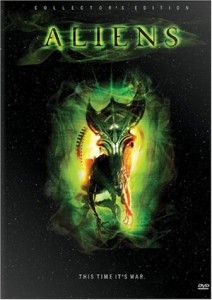an ode to Aliens
¶ by Rob Friesel Every so often, I get into a friendly disagreement (usually with this guy) about whether Alien or Aliens is the superior film. Now to a certain extent, this must be simply a question of taste. But as science fiction usually attracts pedantic nerds with a strong urge to be “right”, I felt compelled to defend my choice. And that choice, for me, is Aliens.
Every so often, I get into a friendly disagreement (usually with this guy) about whether Alien or Aliens is the superior film. Now to a certain extent, this must be simply a question of taste. But as science fiction usually attracts pedantic nerds with a strong urge to be “right”, I felt compelled to defend my choice. And that choice, for me, is Aliens.
Granted, first my disclaimer: I have some sentimental attachments to Aliens which only strengthen the reasoning I otherwise claim is based on my exegesis. 1 2 3
Now, that I prefer Aliens to Alien is not to knock it or disparage it or belittle it. They are both superb, well-crafted films in their own right. And it’s a testament to both that each stands perfectly well without the other. 4 They each have their particular intents. I see Alien as a primarily a horror film that falls upon science fiction for its back-drop and many of its key tropes; whereas Aliens on the other hand is more of a science fiction action/adventure that draws on horror tropes for much of its suspense. 5
Ultimately, where I wind up feeling like Aliens comes out ahead is on two major points.
First, that Aliens is making a more potent and broader statement about evolution. Namely, that when you are talking about strict “natural” competition, that intelligence and technological advancements don’t matter as much as being adapted to the environment and being able to out-perform the competing species. 6 This thematic element is present in both films, but in the sequel, it’s much more pronounced. The original has this inasmuch as you wind up with a pretty low-tech and atavistic conflict between the xenomorph 7 and the crew of the Nostromo. But where Aliens comes out stronger is that the narrative takes an entire crew of “Colonial Marines”, heavily-and-fully armed 8 — presumably absolutely prepared to handle this scenario — and obliterates them, utterly slaughters them. Their weapons and their training are no match for the hostile creatures that they wind up facing on LV-426.
Second, the “threatspace” of Aliens is effectively limitless. In Alien you are dealing with fear in the finite; there is a great deal that is unknown about the danger but you have (a) one xenomorph loose (b) on one ship (c) of a fixed size (d) with a geometry that the crew is presumably intimately familiar. Again: it’s a finite space with finite quantities which is also presumably a well-known and well-navigated space. However, in Aliens, the narrative thrusts Ripley (and the Marines) into (a) an effectively unknown environment 9 (b) of an effectively unknown size which (c) as a large terraforming colony on a whole planet 10 is effectively boundless and (d) is populated by many-orders-of-magnitude-more than just the one adversarial xenomorph. The film then goes even further on this, proving every coping strategy — direct conflict, hiding, barricading, automated remote sentries — to be useless; every time they engage the threat, they only further endanger themselves.
Like I said: I still have nightmares.
- First: I saw Aliens first.[↩]
- Second: Aliens got repeated viewings during my high school era; and notably many of those viewings were with a particular girlfriend.[↩]
- Third: to this day, some (what?) twenty or so years after seeing it for the first time, Aliens still gives me nightmares.[↩]
- I might concede the point that Aliens would not be as strong without Alien preceding it; but I would say that the fact that I saw it several times without feeling the need to go see the original is evidence enough for me.[↩]
- This is not, however, to ignore that they both have largely the same story arc, use many of the same visual idioms (e.g., darkness, mist, mechanical devices) and plot devices (e.g., pursuit, having characters fall out of contact), as well as possessing very similar thematic elements (which we’ll get to later) and mediations (e.g., using media like video feeds and intercoms) within the cinema to relay parts of the story. But this essay isn’t really about their similarities.[↩]
- If this seems a bit too “Darwinian” or “Nietzschean” or “out-of-context E.O. Wilsonian” then please just try to bear with me. We’re not making excuses here: we’re saying that the extrapolation is a fair one through that lens.[↩]
- You know: “the alien”.[↩]
- You were paying attention to Hudson’s rant on the dropship, right?[↩]
- We are to understand that Ripley has been here (i.e., to LV-426) before in the previous film; but considering the colonization and other elements of the setting, it could just as easily be anywhere else in or beyond their so-called known systems.[↩]
- In other words: not just some commercial towing vessel.[↩]
About Rob Friesel
Software engineer by day. Science fiction writer by night. Weekend homebrewer, beer educator at Black Flannel, and Certified Cicerone. Author of The PhantomJS Cookbook and a short story in Please Do Not Remove. View all posts by Rob Friesel →One Response to an ode to Aliens
Pingback: On Aliens | Geek Mountain State
Leave a Reply